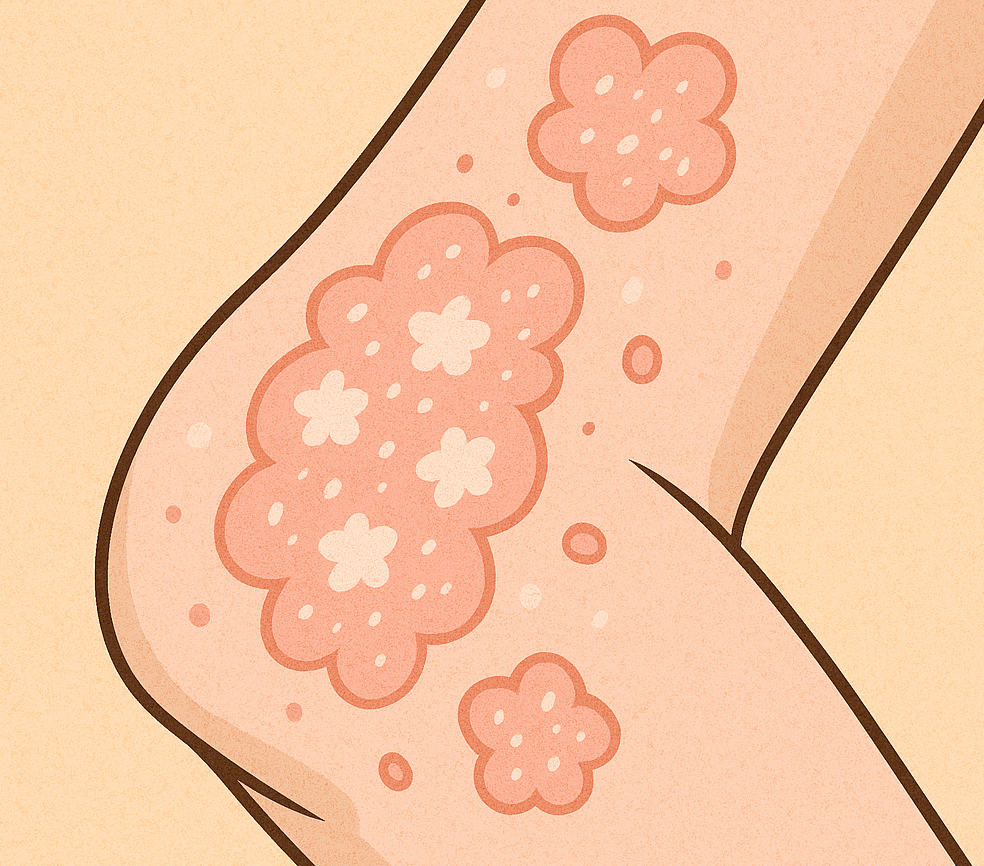Which organs are affected by psoriasis?


have already shared their stories
TL;DR
- Psoriasis is a systemic inflammatory disease, not just a skin condition.
- It can affect the skin, joints, heart, liver, and gut.
- Inflammation linked to psoriasis may raise risks of heart disease and fatty liver.
- Managing lifestyle and inflammation can help protect other organs.
- Always consult a doctor for personalized guidance.
What is psoriasis?
Psoriasis is a chronic inflammatory disease that causes rapid skin cell buildup and scaly plaques [1]. While it mainly affects the skin, inflammation can spread throughout the body — impacting other organs and systems [2].
Which organs are most affected by psoriasis?
1. Skin
The skin is the primary organ affected. Inflammation speeds up cell turnover, leading to red, scaly patches that may itch or hurt [1].
Common types include plaque psoriasis, guttate psoriasis, and inverse psoriasis.
2. Joints
Up to 1 in 3 people with psoriasis develop psoriatic arthritis, an inflammatory joint condition [3].
It causes stiffness, pain, and swelling, especially in the fingers, toes, and lower back. Early diagnosis helps prevent lasting joint damage.
3. Heart and Blood Vessels
People with psoriasis have a higher risk of heart disease [2].
Inflammation can damage blood vessel walls and promote plaque buildup (atherosclerosis). Managing blood pressure, cholesterol, and inflammation lowers this risk.
4. Liver
Psoriasis is often linked with non-alcoholic fatty liver disease (NAFLD) [4].
This happens when fat builds up in the liver due to metabolic and inflammatory changes.
If you live with psoriasis, regular liver health checks are recommended — especially if you take systemic treatments.
5. Gut
Recent research shows a link between psoriasis and gut inflammation [5].
Both conditions share immune pathways (especially IL-23 and IL-17), and some people with psoriasis also develop inflammatory bowel disease (IBD).
Can psoriasis affect mental health?
Yes. Chronic inflammation, visible symptoms, and fatigue can contribute to depression and anxiety.
While the brain isn’t directly affected, psoriasis can strongly influence mental well-being through stress and social impact [1].
How to protect your organs if you have psoriasis
- Stay active: Regular movement reduces systemic inflammation.
- Eat a balanced diet: Choose fruits, vegetables, and omega-3 fats. You can check out our article on which foods to avoid on our blog.
- Limit alcohol and smoking: Both worsen liver and heart inflammation.
- Reduce stress: Stress can trigger skin and joint flares.
- See your doctor regularly: A multidisciplinary approach supports overall health.
Disclaimer: This content is informational. mama health offers information and support and does not replace a doctor.

have already shared their stories
- National Psoriasis Foundation. Understanding Psoriasis. (2023).
- Takeshita J et al. Psoriasis and comorbid diseases. J Am Acad Dermatol. 2017.
- Gladman DD et al. Psoriatic arthritis: overview and diagnosis. Ann Rheum Dis. 2020.
- Candia R et al. Psoriasis and non-alcoholic fatty liver disease. J Hepatol. 2020.
- Scher JU et al. The gut-skin axis in inflammatory disease. Nat Rev Gastroenterol Hepatol. 2020.







